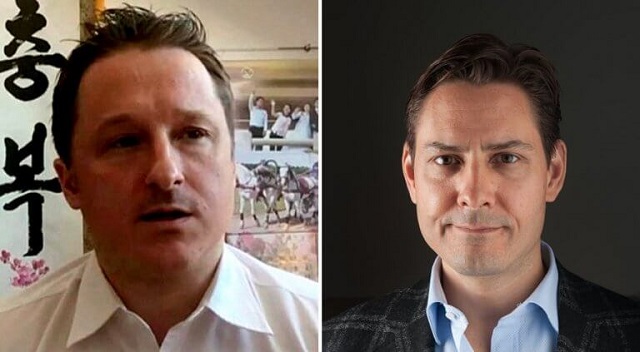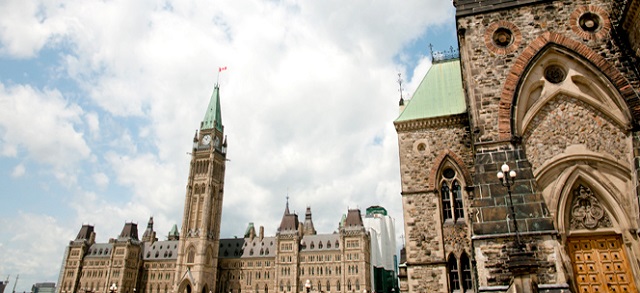Business
China likely to escape scot-free in persecution of two Canadians

From the MacDonald Laurier Institute
By Charles Burton
Beijing propagandists are already using recent claims to vindicate the appalling treatment of Michael Kovrig and Michael Spavor
There is a deep sadness to reports that Michael Spavor feels he was badly wronged by his fellow former political prisoner Michael Kovrig and, by extension, political officers at Canada’s embassy in Beijing and their masters in Ottawa.
Spavor reportedly wants millions in compensation from the Canadian government for its alleged complicity in his detention in his Chinese prison ordeal. If this ends up in court, Kovrig and his superiors would have an opportunity to defend themselves against these allegations, but Beijing propagandists are already using them to vindicate the appalling treatment of Kovrig and Spavor — a gross violation of international law — by a ruthless regime that arrested them to pressure Canada into releasing Chinese Communist Party figure Meng Wanzhou from house arrest in Vancouver.
While few specifics are known about Spavor’s claims, media reports depict a connection to Kovrig’s former job at Canada’s embassy in Beijing, and later with the International Crisis Group think tank, roles in which he would allegedly meet with people in China, engage them in his fluent Mandarin, and mine the conversations for nuggets of insight into China’s political or economic affairs.
Chinese authorities, of course, don’t like such activities. One expects that Kovrig and his superiors, both in government and the ICG, would have been well aware that this type of work would irritate Beijing, thus the danger of arbitrary detention on trumped-up charges was always there whenever he visited China without the protection of a diplomatic passport. And so it was.
One particularly troubling aspect of this sort of activity is the risk it presents to people who might unknowingly be sources for these information-gathering practices. Apparently Spavor and Kovrig routinely got together for drinks and sessions of good-humoured conversation. But friendships with diplomats imply that observations shared in a bar can end up the next morning in a report to Ottawa, and on to the Five Eyes. Was this possibility lost on Spavor? Was Kovrig perhaps not as forthcoming as he could have been about the full dimensions of their chats?
And there is always the possibility that China’s Ministry of State Security has access to Canadian diplomatic communications, which led them to open a file on the two.
Spavor ran a business, Paektu Cultural Exchange, that facilitated sports, cultural, tourism and business exchanges with North Korea. These pricey tours necessitated the transfer of badly-needed foreign currency into North Korea, arguably helping to enable the repressive Pyongyang regime. Perhaps more intriguing, in the course of his work Spavor developed an unlikely rapport with the third-generation Kim family dictator, Kim Jong Un, and was photographed jet-skiing and drinking cocktails with him on a private yacht. It is very plausible that China strongly disapproved of their junior proxy Korean communist dictator cavorting with non-Chinese foreign friends, hence his arrest.
Troublingly, Canadians — who were transfixed and infuriated by the two Michaels’ incarceration — have had little news about Kovrig and Spavor’s China nightmare since their sudden release in September 2021, just hours after Canada released Meng. One wonders if Ottawa really did enough to incentivize China’s Communist authorities to send them home sooner, or if there were other factors in Canada’s murky relationship with Beijing that took priority over what was perhaps downplayed behind closed doors as just another consular matter, one of many that are de facto subordinated to trade and political interests.
We may never see any Global Affairs Canada officials or former diplomats giving public evidence in a Canadian court to defend against Spavor’s accusation. To be sure, much of what goes on between Canada and China — indeed, within our own government internally — is kept from us by the secretive walls of the Security of Information Act.
Perhaps Spavor will be given a big whack of taxpayer money in an out-of-court settlement laced with ironclad nondisclosure provisions. One thing is for sure though. The Chinese authorities who so brutally persecuted him will, as usual, get off scot-free.
Charles Burton is a senior fellow at the Macdonald-Laurier Institute, non-resident senior fellow of the European Values Center for Security Policy in Prague, and former diplomat at Canada’s embassy in Beijing.
Business
Capital Flight Signals No Confidence In Carney’s Agenda

From the Frontier Centre for Public Policy
By Jay Goldberg
Between bad trade calls and looming deficits, Canada is driving money out just when it needs it most
Canadians voted for relative continuity in April, but investors voted with their wallets, moving $124 billion out of the country.
According to the National Bank, Canadian investors purchased approximately $124 billion in American securities between February and July of this year. At the same time, foreign investment in Canada dropped sharply, leaving the country with a serious hole in its capital base.
As Warren Lovely of National Bank put it, “with non-resident investors aloof and Canadians adding foreign assets, the country has suffered a major capital drain”—one he called “unprecedented.”
Why is this happening?
One reason is trade. Canada adopted one of the most aggressive responses to U.S. President Donald Trump’s tariff agenda. Former prime minister Justin Trudeau imposed retaliatory tariffs on the United States and escalated tensions further by targeting goods covered under the Canada–United States–Mexico Agreement (CUSMA), something even the Trump administration avoided.
The result was punishing. Washington slapped a 35 per cent tariff on non-CUSMA Canadian goods, far higher than the 25 per cent rate applied to Mexico. That made Canadian exports less competitive and unattractive to U.S. consumers. The effects rippled through industries like autos, agriculture and steel, sectors that rely heavily on access to U.S. markets. Canadian producers suddenly found themselves priced out, and investors took note.
Recognizing the damage, Prime Minister Mark Carney rolled back all retaliatory tariffs on CUSMA-covered goods this summer in hopes of cooling tensions. Yet the 35 per cent tariff on non-CUSMA Canadian exports remains, among the highest the U.S. applies to any trading partner.
Investors saw the writing on the wall. They understood Trudeau’s strategy had soured relations with Trump and that, given Canada’s reliance on U.S. trade, the United States would inevitably come out on top. Parking capital in U.S. securities looked far safer than betting on Canada’s economy under a government playing a weak hand.
The trade story alone explains much of the exodus, but fiscal policy is another concern. Interim Parliamentary Budget Officer Jason Jacques recently called Ottawa’s approach “stupefying” and warned that Canada risks a 1990s-style fiscal crisis if spending isn’t brought under control. During the 1990s, ballooning deficits forced deep program cuts and painful tax hikes. Interest rates soared, Canada’s debt was downgraded and Ottawa nearly lost control of its finances. Investors are seeing warning signs that history could repeat itself.
After months of delay, Canadians finally saw a federal budget on Nov. 4. Jacques had already projected a deficit of $68.5 billion when he warned the outlook was “unsustainable.” National Bank now suggests the shortfall could exceed $100 billion. And that doesn’t include Carney’s campaign promises, such as higher defence spending, which could add tens of billions more.
Deficits of that scale matter. They can drive up borrowing costs, leave less room for social spending and undermine confidence in the country’s long-term fiscal stability. For investors managing pensions, RRSPs or business portfolios, Canada’s balance sheet now looks shaky compared to a U.S. economy offering both scale and relative stability.
Add in high taxes, heavy regulation and interprovincial trade barriers, and the picture grows bleaker. Despite decades of promises, barriers between provinces still make it difficult for Canadian businesses to trade freely within their own country. From differing trucking regulations to restrictions on alcohol distribution, these long-standing inefficiencies eat away at productivity. When combined with federal tax and regulatory burdens, the environment for growth becomes even more hostile.
The Carney government needs to take this unprecedented capital drain seriously. Investors are not acting on a whim. They are responding to structural problems—ill-advised trade actions, runaway federal spending and persistent barriers to growth—that Ottawa has yet to fix.
In the short term, that means striking a deal with Washington to lower tariffs and restore confidence that Canada can maintain stable access to U.S. markets. It also means resisting the urge to spend Canada into deeper deficits when warning lights are already flashing red. Over the long term, Ottawa must finally tackle high taxes, cut red tape and eliminate the bureaucratic obstacles that stand in the way of economic growth.
Capital has choices. Right now, it is voting with its feet, and with its dollars, and heading south. If Canada wants that capital to come home, the government will have to earn it back.
Jay Goldberg is a fellow with the Frontier Centre for Public Policy.
Business
Budget 2025 continues to balloon spending and debt

The Canadian Taxpayers Federation is criticizing Prime Minister Mark Carney for ballooning spending and debt in Budget 2025.
“Budget 2025 shows the debt continues to spiral out of control because spending continues to spiral out of control,” said Franco Terrazzano, CTF Federal Director. “Carney needs to reverse course to get debt and spending under control because every dollar Canadians pay in federal sales tax is already going to pay interest charges on the debt.
“Carney isn’t close to balancing anything when he’s borrowing tens of billions of dollars every year.”
The federal deficit will increase significantly this year to $78.3 billion. There is no plan to balance the budget and stop borrowing money. The federal debt will reach $1.35 trillion by the end of this year.
Debt interest charges will cost taxpayers $55.6 billion this year, which is more than the federal government will send to the provinces in health transfers ($54.7 billion) or collect through the GST ($54.4 billion).
Budget 2025 increases spending by $38 billion this year to $581 billion. Despite promises to control spending in future years, Budget 2025 projects that overall spending will continue to rise by billions every year.
“Canadians don’t need another plan to create a plan to meet about cutting spending, Canadians need real spending cuts now,” Terrazzano said. “The government always tells Canadians that it will go on a diet Monday, but Monday never comes.
“And the government isn’t really finding savings if it’s planning to keep increasing spending every year.”
Budget 2025 commits to “strengthening” the industrial carbon tax and “setting a multi-decade industrial carbon price trajectory that targets net zero by 2050.”
“Carney’s hidden carbon tax will make it harder for Canadian businesses to compete and will push Canadian entrepreneurs to set up shop south of the border,” Terrazzano said. “Carney should scrap all carbon taxes, cut spending and stop taking so much money from taxpayers.”
-

 Bruce Dowbiggin2 days ago
Bruce Dowbiggin2 days agoA Story So Good Not Even The Elbows Up Crew Could Ruin It
-

 Agriculture13 hours ago
Agriculture13 hours agoDanish Cows Collapsing Under Mandatory Methane-Reducing Additive
-

 Alberta2 days ago
Alberta2 days agoCanada’s heavy oil finds new fans as global demand rises
-

 Health1 day ago
Health1 day agoRFK Jr’s argument for studying efficacy of various vaccines
-

 Daily Caller1 day ago
Daily Caller1 day agoTrump Reportedly Planning Ground Troops, Drone Strikes On Cartels In Mexico
-

 Addictions2 days ago
Addictions2 days agoThe War on Commonsense Nicotine Regulation
-

 Business1 day ago
Business1 day agoTrump’s Tariffs Have Not Caused Economy To Collapse
-

 Business2 days ago
Business2 days agoCarney government should retire misleading ‘G7’ talking point on economic growth





